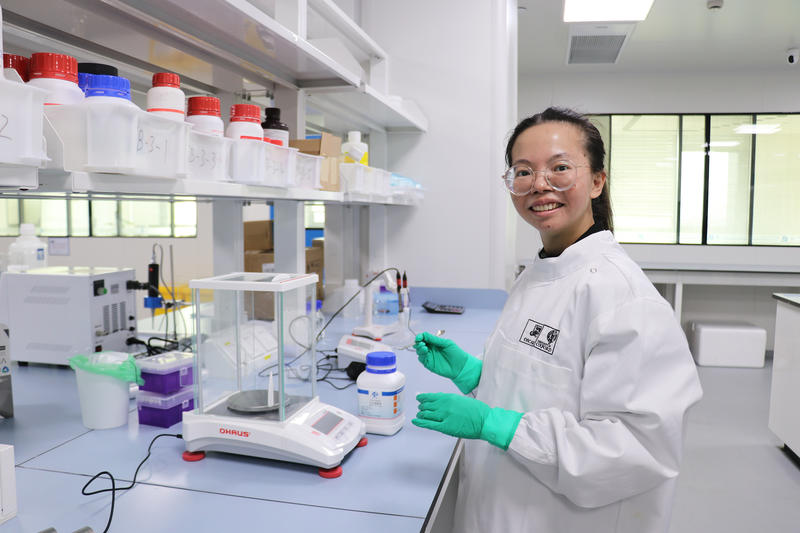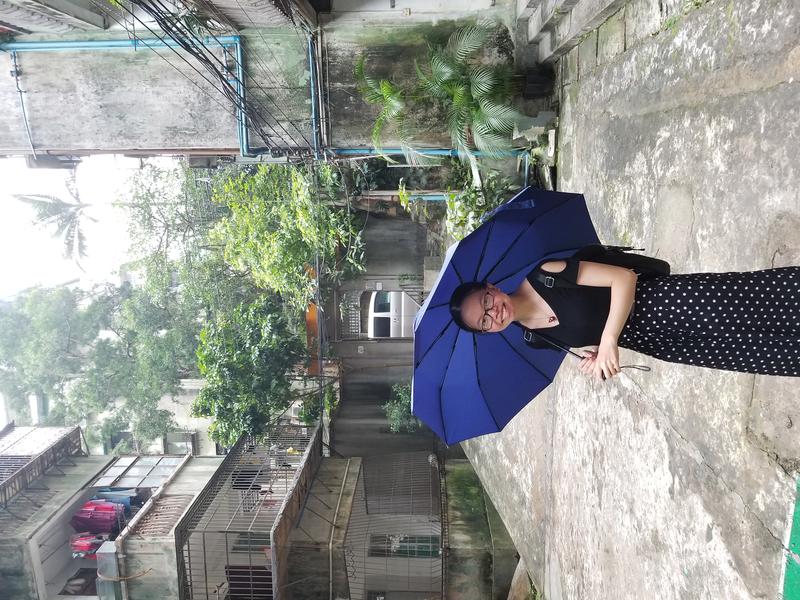Dr. Huilin Li: ‘I like the unconventional and innovative nature about scientific research.’

Dr. Huilin Li
Research Scientist in Prof. Zhanfeng Cui 's group
Dr. Huilin Li joined OSCAR in September 2021 as a Research Scientist in the Regenerative Medical
Engineering group, led by Prof. Zhanfeng Cui.
Could you tell us something about your work at OSCAR?
Generally speaking, my scientific research work at OSCAR is related to the project of cell therapy.
As cell types are various, some cells themselves are a therapeutic approach. For example, in the treatment of tumor, we can load tumor-targeted drug proteins or cytokines on cells.
Drug loading is to make cells become a drug loading system and deliver drugs to specific parts, so as to play a therapeutic role. At that time, cells play the role of an injector. The loading of cytokines is for further stimulating the anti-tumor ability of a human body and mobilizing our immune system to kill tumor. Cell therapy also includes the combination of cells with materials as a regenerative therapeutic approach such as the well-known skin graft and artificial joint.
What is the value of your scientific research?
If the commercialization of our scientific research results could be achieved in the end, then they are expected to be applied on patients in the future, or even become a normal anti-tumor therapeutic approach like chemoradiotherapy which was firstly developed in lab, and then has gradually become a common therapeutic approach through long-term clinical experiments step by step.
So, the value of our scientific research lies here. With the constant iteration and build-up of technologies, our research will possibly provide not just a new anti-tumor therapeutic approach for patients and to hospitals, but also one that alleviates patent sufferings in a better way and even with affordable prices.

Huilin’s family sees her off when she sets out to pursue her doctoral studies in Beijing.
What’s your take on the theme of this year’s International Women’s Day ‘breaking the bias’?
In my opinion, the fact that I stand here represents, in a sense, my take on gender bias.
I was born in a small county where a person with a bachelor degree was very rare, no matter whether female or male. Most students quit studying after finishing their study at junior middle schools. There was even no chance to discuss the issue about if a girl is suitable for studying science because most of them dropped out before their second year in senior middle school. Many of the girls entered the working world at an early age, and then formed a family, becoming housewives. A female with a PhD degree like me in that small county is similar to an extra-dimensional creature. But things have improved a lot since I was born. At least, most of my classmates were enrolled in senior middle schools.
Growing up, I had people around me who often poured cold water on my pursuing higher education. But my parents did not stop me from studying. Considering the environment where they grew up, it is considerably precious, which is also a great encouragement to me. In addition, my teachers at my senior middle school greatly inspired me, presenting various possibilities in the future for me.
I’ve come so far partly because I was a loner at schools, which helped me focus on my study. During my time studying at the junior and senior middle schools, although I was not sure about what I would do in the future, I was very aware of the things I didn’t enjoy at that time. For example, I didn’t like putting on makeup. I felt uncomfortable to put cosmetics on my face. I didn’t enjoy shopping, as I thought it was too much trouble haggling. I didn’t enjoy watching TV drama because the plotlines were so predictable, and they bored me easily. After ruling out what I did not want to do, the only thing left was reading books. That said, I would’ve ended up in a whole different place if shopping and watching TV series had been to my liking at that time.
Why did you choose a career in scientific research?
Actually, I wanted to become a clinical doctor at my senior middle school time. But the voluntary filling system for college admission in my province was updated in that year. We did not have any experience working with the new system. By mistake, I selected a science discipline of “Biological Technology” instead of clinical discipline. I thought about changing my major, but that would mean six years of study for a bachelor’s degree, which was too long. In my fourth year in the university, I started to prepare my postgraduate entrance examination on one hand and joined in the laboratory of my instructor on the other hand. I felt it was good to do scientific research after I got to know it. After that, I started my postgraduate study, embarking on a road of doing scientific research.
Surely, it is passion that keeps me going. I am fond of new things since I was a child. I lose interest in something as soon as it gets stuck in a rut without innovation. For example, I was once addicted to youth literature works when I was a junior middle school student. However, after finishing reading two or three books, I found that all plots were similar. I think when a literature work becomes predictable, it will be discarded by readers sooner or later.
On the contrary, doing scientific research is always unconventional and innovative as long as you are smart enough to keep up. I feel happy when I collect experimental results, sort out these results into graphs, and form into a paper for publication. Seeing my research getting patented and receiving distinctions are also positive incentives for me to do scientific research.
Why did you choose to join OSCAR?
I tried to find a job in Beijing after graduation, and the salary offered by some enterprises was really attractive. But according to my limited vision at that time, I believed that I was only needed as a “worker ant” there without any promotion space. I even believed that I would be made redundant by them after my three-year service. Or maybe I could quit my job. Considering the limited resources of these platforms, I thought that my gains were not worth the three years I should spend there.
Afterwards, I found that leading enterprises of my field are concentrated in areas around Jiangsu and Zhejiang provinces. Resources and policy supports there are more advantageous. I finally decided to join in OSCAR after comparing several employers based on the comprehensive consideration of conditions like: if the job matches my professional background; the company background and concept of the enterprise; the overall structure and hardware facilities; the background of scientist teams; and if the scientific research environment is stable.
What are your comments after working at OSCAR for half a year?
The entire environment is clean and orderly. Employees are well organized to perform their own functions. Additional energy losses of scientists will not happen. OSCAR is an ideal place for me to do scientific research except that there are few male colleagues on my floor to lend a helping hand with heavy objects, ha-ha. I’ve successfully transformed from a student to an employee in such environment in the past half a year.



